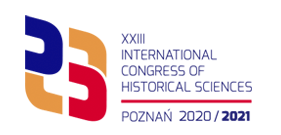Last April, we announced that the XXIII International Congress of Historical Sciences in Poznań was postponed to 22–28 August 2021.
Today, we are happy to inform you that the board of ICHS/CISH and the organizing committee have agreed that the XXIII Congress in Poznań will indeed be held on this date regardless of the circumstances. Every effort will be made to hold it in a traditional “face to face” form – in compliance with recommended health protocols and with the utmost care for the safety of participants.
The content of the programme therefore remains the responsibility of the panel organizers whom we thank in advance for their efforts.
We are aware that moving the congress into the virtual sphere would be a big loss for all of us. However, in the face of the pandemic spread of Covid-19, the organizing committee, in close contact with the ICHS board, is considering the possibility of offering participation in some congress events also on a virtual basis. This may include both general assemblies and the award ceremony, which we still hope will take place in normal form.
We would like to remind you that with the decision to postpone the congress, the early bird registration has been extended to March 31, 2021. There is also still possibility to apply for support within the solidarity fund.
All final decisions regarding the congress, especially its form, will be announced in January 2021.
Best wishes,
Board of ICHS: Andrea Giardina, Catherine Horel, Marjatta Hietala, Eliana Dutra, Pim den Boer, Sacha Zala, Joel Harrington, Lim Jie-Hyun, Krzysztof Makowski, Matthias Middell, Lorina Repina, Tao Wenzhao,
Tomasz Schramm and the organizing committee
Current announcements concerning the congress will be posted on the congress website: https://ichs2020poznan.pl/en/




